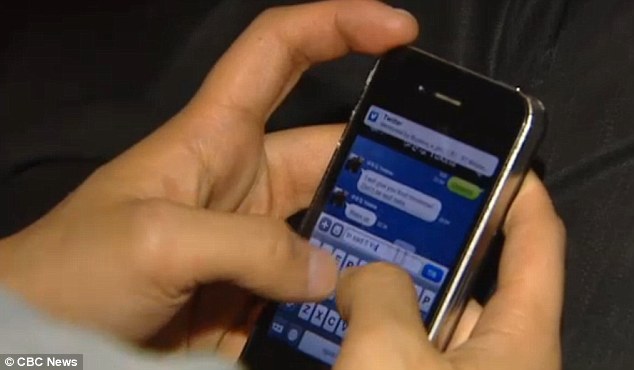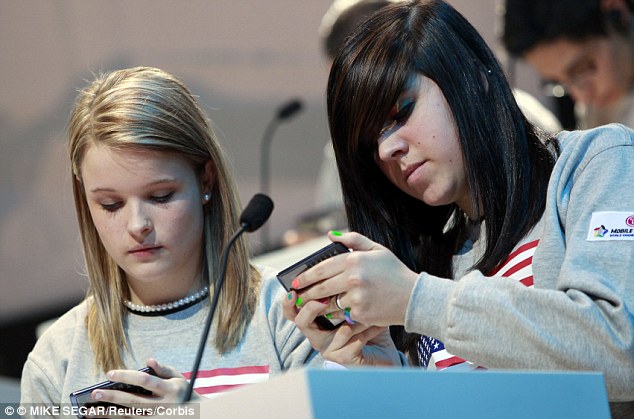-
Students who texted the most displayed evidence of racism
-
Compulsive texters more likely to have shallow and rapid thoughts
-
Author of the study believes the effect of constant texting and tweeting needs further investigation
By
James Daniel
03:54 GMT, 13 April 2013
|
04:04 GMT, 13 April 2013
Teenagers who text more than 100 times a day tend to be shallow, image-obsessed and driven by wealth - not to mention pretty bad at spelling.
The study from the University of Winnipeg suggests that a lot can be learned about a person’s personality simply from the number of texts they send.
The most incessant texters often turn out to be a slightly more racist than others.
Scroll down for video...

Not getting the message: Research suggests frequent texters tend to be shallow

Personality: Psychologists say those who text more than 100 times a day are more interested in wealth and image
The data was gathered over a period of three years from 2,300 psychology students at the University of Winnipeg.
The theory the university study tried to test was that constant use of twitter and texting for communication results in a world where people have quick and shallow thoughts.
People with superficial opinions with little substance beneath.
The results indicate that students who text frequently place less importance on moral, aesthetic and spiritual goals and greater importance on wealth and image.

Long term: The study conducted over a period of three years amongst 2,300 students at the University of Winnipeg

Superficial thinking: Texting and using Twitter for extreme periods of time can change your thought process
Strikingly, the study states those who text more than 100 times a day were 30 per cent less likely to feel strongly that leading an ethical, principled life was important, in comparison to those who texted 50 times or less a day.
The students texted, some spoke on cellphones, and some did neither. The students rated their feelings towards different social groups.
Those who had been texting the most, rated ethnic-minority groups more negatively.
In the most extreme cases, 30 per cent of the survey-takers texted more than 200 times a day and that 12 per cent texted at least 300 times a day.

Priorities: Heavy teen texters place less importance on moral, aesthetic, and spiritual goals, and greater importance on wealth and image
The study was inspired by the 'shallowing hypothesis' first described by Nicholas Carr in his 2010 book The Shallows: What the Internet is Doing to Our Brains.
It does not suggest that shallow mindedness is at all new, merely the growth of texting and twitter has resulted in new avenues for expression that has made such thoughts more acceptable.
The theory states 'ultra brief social media like texting and Twitter encourages rapid, relatively shallow thought and consequently very frequent daily use of such media should be associated with cognitive and moral shallowness.'
'The values and traits most closely associated with texting frequency are surprisingly consistent with Carr’s conjecture that new information and social media technologies may be displacing and discouraging reflective thought,' Dr. Paul Trapnell, associate professor of psychology at The University of Winnipeg, said in a statement. 'We still don’t know the exact cause of these modest but consistent associations, but we think they warrant further study.'
-
 Teenage girl killed while walking on motorway at 4am hours...
Teenage girl killed while walking on motorway at 4am hours...
-
 Maggie's golden grandchildren: Amanda Thatcher, 19, voted...
Maggie's golden grandchildren: Amanda Thatcher, 19, voted...
-
 Town turns out to honour war veteran who died in a care home...
Town turns out to honour war veteran who died in a care home...
-
 Orthodox Jewish man photographed covering himself in plastic...
Orthodox Jewish man photographed covering himself in plastic...
-
 Scotland Yard sergeant resigns in disgrace over Thatcher...
Scotland Yard sergeant resigns in disgrace over Thatcher...
-
 Face etched with grief: Carol Thatcher returns to her...
Face etched with grief: Carol Thatcher returns to her...
-
 That's what you call a sting operation: Police seal off...
That's what you call a sting operation: Police seal off...
-
 Princess Diana fund cynically hijacked by the Left: How...
Princess Diana fund cynically hijacked by the Left: How...
-
 Five people from the same family, one of them believed to be...
Five people from the same family, one of them believed to be...
-
 F*** For Forest: The eco-activists who make pornographic...
F*** For Forest: The eco-activists who make pornographic...
-
 Merkel could let UK claw back powers from the EU, in a...
Merkel could let UK claw back powers from the EU, in a...
-
 Soft porn model, 19, let off wearing ankle tag for criminal...
Soft porn model, 19, let off wearing ankle tag for criminal...